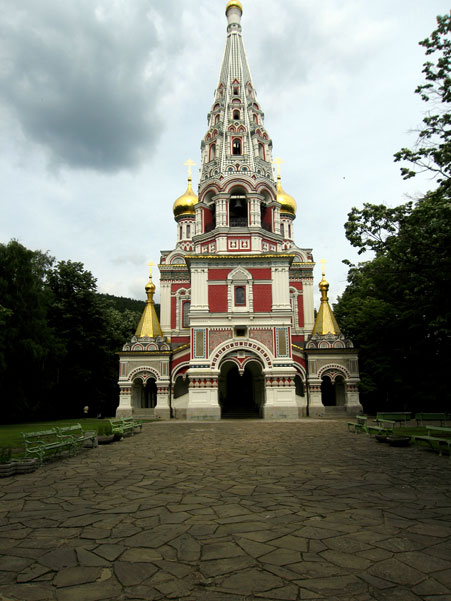
|
|
When we leave the hotel in the morning a masked municipal worker is spraying herbicide on the grass and weeds growing in the gutters. We set off for Shipka, to visit the memorial church with its golden domes that can be seen for miles across the valley floor. The weather is treating us well and when we arrive the groundsman is taking advantage of the perfect grass-cutting weather. I do some recording, going from inside the building to outside, which is also an acoustic transition from the sacred to the bucolic. The church commemorates the battles of the Shipka pass and was consecrated at the beginning of the 20th century though its appearance dislocates it in time and space: being built in a style prevalent at the time of Mozart it looks as if it had been uprooted from central Moscow and transplanted to the Bulgarian hillside in the 18th century.
The town itself is small, spreading down the hillside into the valley, and we have almost driven out of it when L notices a ruined house that used to be a substantial residence. Across from it is a community centre that has been caught in the process of a never-to-be-completed expansion: around the back of the building, it may date from the beginning of the 20th century, are the half-finished extensions that would have doubled its size. This is another of the cultural centres that have a long history in Bulgaria going back to at least the 19th century. The communist administration tapped into this long tradition, initially following more liberal (and liberating) ideals relating to the potential inherent in the individual, but slowly moving towards the more restrictive doctrinal teachings of scientific socialism where the individual was completely subordinate to the state agenda. Thus cinema, theatre and other activities were used as vehicles for propaganda to these ends. But, as is generally the case in countries under totalitarian rule, there were also nodes of resistance undermining one-sided interpretations and proposals by drawing on pre-communist figures, hidden histories and alternative notions of the relation of the state to the individual. Messages became equivocal, often heavily coded by necessity, meanings subversively contested. Ironically, by declaring a major interest in culture, most communist states generated widely-based, self-organised, cultural engagement and thus a domain in which disputed issues might be explored, outside or inside the system, depending on the strategy. |